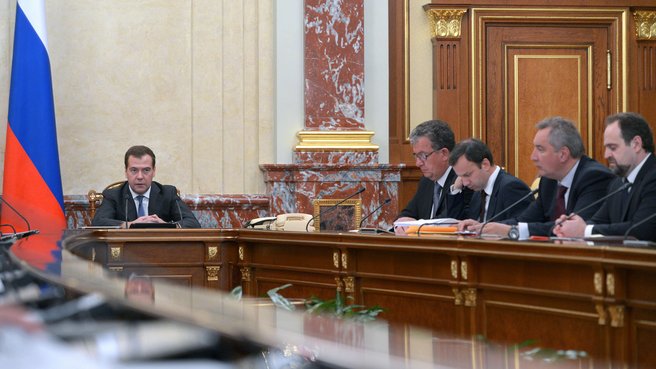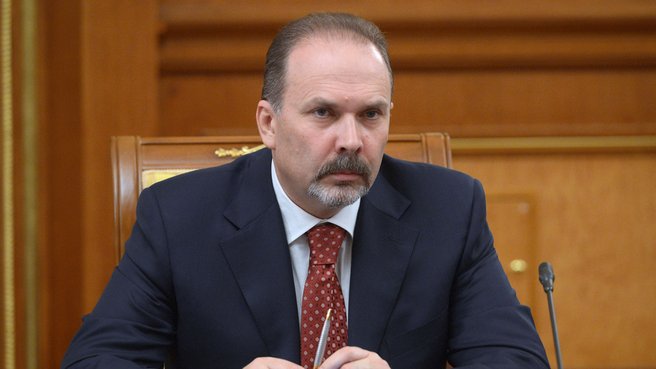Agenda: Competition on the communication services market and nine other issues.
Dmitry Medvedvev’s introductory remarks:
Good afternoon. I’d like to say a few words about the issues on the agenda of our meeting today. The first issue concerns competition on the communication services market, notably mobile and fixed telephone lines and broadband internet access. This is one of the key segments of a technology-driven economy, and it has experienced truly dynamic growth in this country. I’d like to remind you that during a government meeting in late October we discussed a draft strategy for developing the IT sector until 2025 and IT market reserves. Experts believe that this market will grow by up to 10% annually, but it is obvious that the communications and telecommunications market has a comparable potential. In 2012, communication services were valued at 1.5 trillion roubles and their share accounted for 2.5% of GDP.
Considering the size of our country and the growth rate of telecom technologies, one of our strategic goals is to bridge the digital divide between regions as quickly as possible. The integrity of the country’s information space largely depends on this. We must ensure nationwide access to cultural achievements and develop remote medical, education and retail services. At the same time, we must ensure fast (that is, quality) and inexpensive internet access, including in the regions that are located at a long distance from the main communication venues.
Dmitry Medvedev: “Considering the size of our country and the growth rate of telecom technologies, one of our strategic goals is to bridge the digital divide between regions as quickly as possible.”
The most effective method of bridging the digital divide is competition, or rather the creation of modern standards of competition in this sector.
The communications market has a number of specific features. At the same time, we should not only help large players, which already have sufficiently high demand for their services. We need to attract new investors to under-populated regions, where the profit rate may be lower than elsewhere. These investors will certainly influence the quality and prices of mobile and fixed telephone services, including within the framework of public-private partnership.
In addition, we need new approaches and new business models. I’d like to remind you about the idea of extending coverage to cities with the population from 10,000 to 500,000, irrespective of their location. We must also ensure that people are allowed to keep their telephone numbers when changing the service provider. The decisions on this issue have been adopted. I hope that this will help us to improve the quality of services and will enable subscribers to choose between service providers. However, we must implement this idea without delay.
The minister, who will deliver a report, and other colleagues who will speak on this issue in short, will tell you about new services and incentives to develop the communications market.
Dmitry Medvedev: “We cannot allow rich people to buy up parties, and so we have proposed a new rule on membership and entrance fees per private individual. Annual membership fees per person cannot exceed 4.33 million roubles. I believe that these are democratic proposals and suggest that we support them.”
We will also discuss a draft law that aims to eliminate discrepancies between Russian legislation and the Hague Convention on the Civil Aspects of International Child Abduction. This draft law has to do with the safety and wellbeing of our children and allows for resolving child custody disputes between our nationals and their foreign spouses as painlessly as possible. I’d like to remind you that this is a high-profile issue and that such cases immediately attract public attention, no matter where they happen. This also happens in our country. We have seen some disputes between individuals grow into international conflicts. Some parents resort to illegal methods, taking their children away without the other spouse’s permission, in fact abducting them. This is absolutely inadmissible, and it is to prevent such developments that Russia joined the Convention on the Civil Aspects of International Child Abduction in 2011.
The convention simplifies the procedure for returning children to their home country. Actually, it has been used several times in this country, but we have drafted several amendments to our legislation to ensure the comprehensive use of this document. These amendments specify the legal procedure for bringing such cases to court and for hearing these cases. It is planned that one court in each federal district will take on such cases in the obligatory presence of a prosecutor and representatives of guardianship and custodianship agencies. The court can prohibit the defendant from changing the child’s place of residence and, should the defendant flee together with the child, put them on the wanted list and turn the case over to court bailiffs or other sources, including private investigators. I hope that this will help us to resolve disputes between individuals in a more civilised manner.
Another important element of this law is designed to promote the development of the political system and to fight corruption. This concerns the funding of political parties, and we have proposed it not only because we need to honour our international commitments, which we assumed in the framework of the Council of Europe Anti-Corruption Group; the bigger idea is to make our legal and hence party system more transparent, open and competitive. The issue concerns party funding.
So far, political parties can take out loans during the election campaign or secure temporary funding on general or even exceedingly easy terms. We understand that this is unusual funding and unusual civil transactions because they apparently have public consequences. Actually, there was a loophole in the rules on the creation of election funds. We have introduced a limit for replenishing party funds; a party is allowed to accept up to 43.3 million roubles in donations from one legal entity or 4.33 million from one individual within a year.
This draft law proposes limiting the maximum loan to five times the permitted donation, which is quite a lot, around 216 million roubles from legal entities or 21 million from individuals. I believe that this is a reasonable limitation. In general, we should not encourage political parties to live on funds borrowed from party members. They will now have to report such borrowings in detail, including the essential elements of transactions such as the interest rate and the duration of the contract and guarantees provided under loan agreements. There must be a state audit [of these funds], including the measures that are currently applied to parties that receive state financing.
This draft law can be also useful for developing the party system as a whole and for new parties on the political stage. We cannot allow rich people to buy up parties, and so we have proposed a new rule on membership and entrance fees per private individual. Annual membership fees per person cannot exceed 4.33 million roubles. I believe that these are democratic proposals and suggest that we support them.
In conclusion, I’d like to again present our new colleague, Mikhail Men, who is attending a Government meeting for the first time as the head of a new ministry, which has been established to deal with issues of construction, housing and utilities. Mr Men, we wish you success. I hope that all of the Government members will provide all-round assistance to the new ministry and the new minister.
Let’s start working.
<…>














